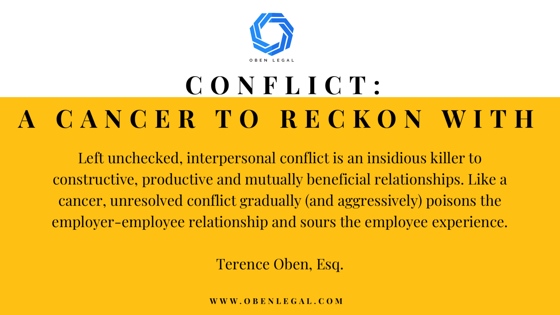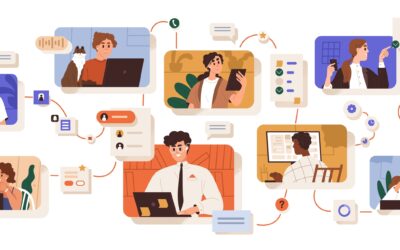What Every Manager Should Know About Conflict in The Employment Relationship: A Cancer To Reckon With

Therefore, how we deal with, and manage grievances and contentious situations is emerging as a huge determinant of successful employment relationships, and a critical indicator of healthy organizational cultures.
Unfortunately, a majority of organizations are simply ill equipped in their understanding of, and approaches for adequately dealing with interpersonal and other forms of conflict that arise in workplaces.
This article is an introduction to foundational concepts on this very important human topic. We invite you to share your thoughts with us and share with your teams, but most importantly to look within your team, department, or organizations to see how the true costs of conflict are deteriorating these important relationships and impairing your performance.
On Differences and Conflict.
In this info graphic, we list six overarching themes that cause or contribute to conflict. As individuals, our different personalities, values, needs, and interests, can and often create expectations and perceptions that manifest as experiences of conflict – frustration, anxiety, anguish, a sense of crisis, etc., – when we encounter conditions contrary to our expectations and perceptions. In many cases, without ‘expert’ help, and sometimes even with it, these encounters can become volatile and chaotic from unexamined differences and poorly managed conflict.
“One of the most important hallmarks of sound leadership and governance is the effective management and oversight of grievances and conflict.”
In organizational environments, with increasing complexity and diversity, and many people interacting at different levels, this is even more pronounced – though usually silent. Thus, one of the most important hallmarks of sound leadership and governance is effective management and oversight of conflict.
Why is conflict hard to manage?
With the proper perspective and context, conflict itself isn’t inherently bad because different doesn’t mean wrong or bad. But the predicament is we aren’t taught how to deal with conflict as very few formal school educational or training programs teach these skills. Since organizations are not designed to manage conflict, the conventional organizational mechanisms for conflict resolution are limited and mostly an afterthought (reactive).
Also, hardly any form of conflict resolution and management training is offered in most organizational training requirements and curriculums.
Even where grievance or conflict management mechanisms exist, they often are narrowly designed and lack adequate procedures or controls to safeguard against unfair or unbiased decisions by managers. For example, we are often limited to so called “open door” policies or other HR processes that have proven to be unfair or one-sided to adequately manage conflict. So many attempts at resolving differences and grievances quickly turn adversarial with costly litigations where the only real winners are the lawyers.
Why is Fairness Important?
In exchange for our contributions of time, effort, and taxes, our affiliation with organizations provide us with important economic and socioemotional benefits that meet our needs for material well-being, comfort, standard of living, and, feelings of status and value within a group. This means managers’ decisions regarding employee-related matters seriously affect these benefits, particularly those related to discipline, layoffs, transfers, promotions, other work privileges, schedules, and wages.
To be fair means our decisions must satisfy the spirit of ‘due process’ principles. That is, we must perceive the outcomes of decisions as fair (i.e. free from bias or undue prejudice). And, the procedures used in decision-making processes must also be perceived as equitable or fair. Because, unfair procedures tend to yield unfair outcomes – think fruits of a poisonous tree. In either case, perceptions of unfair treatments can have significantly damaging effects on the employment relationship which in turn leads to attrition, lower commitment, lower satisfaction, conflict, theft, aggression, etc.
Perceptions of unfair treatments can have significantly damaging effects on the employment relationship which in turn leads to attrition, lower commitment, lower satisfaction, conflict, attrition, theft, aggression, etc.
But our experience shows that not all managers know how to manage their work force effectively, nor do they treat their employees fairly. And thanks to the proliferation of communications technology, the public’s awareness of once hidden unfair and unethical employment practices like harassment, bullying, abusive dismissals, etc., is giving voice to these issues. As a result, litigation and regulatory scrutiny to protect the rights and interests of employees is on the rise.
We all know that the fallout from these adverse events significantly erodes the reputation of organizations and managers involved, with a direct negative impact on employee morale and the organization’s performance.
A Better Way Forward
To operate effectively as organizations become more interconnected, interdependent, and interrelated, the modern leader must augment their management capacity and pay attention to devices for reducing conflict to augment your employee experience. This includes the application of ‘due process’ protections of fairness to conflict management and employee grievances.
In this era of increased litigation, Oben Legal’s Conflict Management and Oversight programs offer companies both the assurances of due process and fairness while providing a quick and inexpensive means for resolving disputes.
Employers must establish procedures for dealing with personnel matters, and those procedures need to be administered consistently and fairly. This protects employee rights and interests by ensuring fair outcomes in decisions that affect their lives, as well as fairness in the procedures used to reach these decisions.
But there’s hope and there is an alternative. I recently partnered with LexisNexis to produce a one-of-a-kind practice note that helps employers develop and maintain an effective and legally compliant Peer Advisory Board program (PAB or PAB Program). In the next article in the conflict series, we discuss the ethics of conflict management and how our revolutionary Peer Advisory Board Program is transforming cultures and the employee experience.
Visit our Conflict Management page to learn more about how Oben Legal is transforming they way organizations manage conflict and grievances.
[fusion_button link=”Mailto:info@localhost” text_transform=”none” title=”” target=”_self” link_attributes=”” alignment=”center” modal=”” hide_on_mobile=”small-visibility,medium-visibility,large-visibility” class=”” id=”” color=”custom” button_gradient_top_color=”” button_gradient_bottom_color=”” button_gradient_top_color_hover=”” button_gradient_bottom_color_hover=”” accent_color=”” accent_hover_color=”” type=”” bevel_color=”” border_width=”” size=”” stretch=”default” shape=”” icon=”” icon_position=”left” icon_divider=”no” animation_type=”” animation_direction=”left” animation_speed=”0.3″ animation_offset=””]Contact Us[/fusion_button]





0 Comments